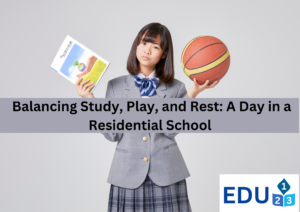 Residential schools are designed to provide more than just academic excellence—they offer a well-rounded routine where students learn to manage their time, energy, and priorities. Many boarding schools in Bangalore have mastered this balance, creating daily schedules that promote intellectual growth, physical well-being, and emotional stability. The result? Confident, disciplined students who know how to handle both challenges and downtime with maturity.
Residential schools are designed to provide more than just academic excellence—they offer a well-rounded routine where students learn to manage their time, energy, and priorities. Many boarding schools in Bangalore have mastered this balance, creating daily schedules that promote intellectual growth, physical well-being, and emotional stability. The result? Confident, disciplined students who know how to handle both challenges and downtime with maturity.
A typical day in a residential school is thoughtfully structured. It blends classroom sessions, sports, group study, self-reflection time, and adequate rest. This rhythm teaches students life-long habits of balance and discipline—skills essential far beyond the school years.
Morning: A Fresh Start with Purpose
The day usually begins early, around 5:30 or 6:00 AM, when students rise and freshen up. The morning hours often include:
Physical exercise or yoga to energize the body
Morning assembly with news updates or motivational talks
Nutritious breakfast to fuel the brain for learning
Starting the day with discipline sets a positive tone and prepares students to focus on academics with clarity and enthusiasm.
Academic Blocks: Structured, Engaging, and Interactive
Classes usually begin by 8:00 AM and continue until lunchtime. Residential schools ensure these periods are not just lecture based. Interactive teaching methods, smart classrooms, group discussions, and project-based learning keep students engaged.
Subjects are often spaced out with short breaks in between, helping avoid mental fatigue. Teachers encourage participation and personal feedback, allowing students to track their own progress.
Midday: Nutrition Meets Relaxation
Lunch is more than just a meal—it’s a break to socialize, unwind, and recharge. School cafeterias are built to promote community dining and serve balanced, healthy meals. Many schools even involve students in food discussions, helping them make mindful dietary choices.
After lunch, there may be a short rest period or quiet time, especially for junior students, giving them a mental breather before diving into the second half of the day.
Afternoon: Sports, Hobbies, and Skill-Building
The post-lunch hours are where residential life shines. Students head to various clubs, hobby rooms, or sports fields. Activities may include:
Team sports like football, cricket, or basketball
Music, dance, art, or drama sessions
Robotics, debate, or science clubs
Nature walks or gardening in green campuses
This time allows students to explore passions beyond textbooks and discover talents they never knew they had.
Evening: Study Time and Peer Learning
Before dinner, schools often schedule a supervised study hour or group study sessions where students revise, complete assignments, and help each other. This is an essential part of hostel life—learning to focus, cooperate, and self-manage in a shared environment.
Teachers or dorm mentors are available to guide or answer doubts, encouraging an atmosphere where asking for help is normal and respected.
Night: Winding Down the Right Way
Dinner is typically served around 7:30 PM, followed by a lighter, relaxed schedule. Students may read, journal, or chat with dorm mates before lights-out. Devices are often restricted, encouraging a digital detox before bedtime.
By 9:30 or 10:00 PM, it’s lights out—ensuring students get 7-8 hours of rest to recover and reset for the next day.
Conclusion
Life in a residential school is a thoughtful blend of study, play, and rest. The daily schedule is not overly rigid, but it’s structured enough to build strong habits, independence, and a sense of responsibility. At well-established boarding schools in Bangalore, students don’t just learn facts—they learn balance. And in a world that’s always rushing, that might be the most valuable lesson of all.